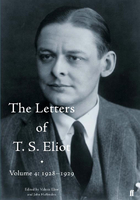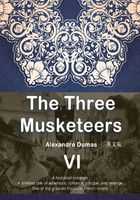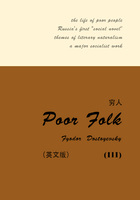"To think
That all this long interminable night,
Which I have passed in thinking on two words—
'Guilty'—'Not Guilty!'—like one happy moment
O'er many a head hath flown unheeded by;
O'er happy sleepers dreaming in their bliss
Of bright to-morrows—or far happier still,
With deep breath buried in forgetfulness.
O all the dismallest images of death
Did swim before my eyes!"
—WILSON.
And now, where was Mary?
How Job's heart would have been relieved of one of its cares if he could have seen her: for he was in a miserable state of anxiety about her; and many and many a time through that long night he scolded her and himself; her for her obstinacy, and himself for his weakness in yielding to her obstinacy, when she insisted on being the one to follow and find out Will.
She did not pass that night in bed any more than Job; but she was under a respectable roof, and among kind, though rough people.
She had offered no resistance to the old boatman, when he had clutched her arm, in order to insure her following him, as he threaded the crowded dock-ways, and dived up strange by-streets. She came on meekly after him, scarcely thinking in her stupor where she was going, and glad (in a dead, heavy way) that some one was deciding things for her.
He led her to an old-fashioned house, almost as small as house could be, which had been built long ago, before all the other part of the street, and had a country-town look about it in the middle of that bustling back-street. He pulled her into the house-place; and relieved to a certain degree of his fear of losing her on the way, he exclaimed—
"There!" giving a great slap of one hand on her back.
The room was light and bright, and roused Mary (perhaps the slap on her back might help a little too), and she felt the awkwardness of accounting for her presence to a little bustling old woman who had been moving about the fireplace on her entrance. The boatman took it very quietly, never deigning to give any explanation, but sitting down in his own particular chair, and chewing tobacco, while he looked at Mary with the most satisfied air imaginable, half triumphantly, as if she were the captive of his bow and spear, and half defying, as if daring her to escape.
The old woman, his wife, stood still, poker in hand, waiting to be told who it was that her husband had brought home so unceremoniously; but, as she looked in amazement, the girl's cheek flushed, and then blanched to a dead whiteness; a film came over her eyes, and catching at the dresser for support in that hot whirling room, she fell in a heap on the floor.
Both man and wife came quickly to her assistance. They raised her up, still insensible, and he supported her on one knee, while his wife pattered away for some cold fresh water. She threw it straight over Mary; but though it caused a great sob, the eyes still remained closed, and the face as pale as ashes.
"Who is she, Ben?" asked the woman, as she rubbed her unresisting, powerless hands.
"How should I know?" answered her husband gruffly.
"Well-a-well!" (in a soothing tone, such as you use to irritated children), and as if half to herself, "I only thought you might, you know, as you brought her home. Poor thing! we must not ask aught about her, but that she needs help. I wish I'd my salts at home, but I lent 'em to Mrs. Burton, last Sunday in church, for she could not keep awake through the sermon. Dear-a-me, how white she is!"
"Here! you hold her up a bit," said her husband.
She did as he desired, still crooning to herself, not caring for his short, sharp interruptions as she went on; and, indeed, to her old, loving heart, his crossest words fell like pearls and diamonds, for he had been the husband of her youth; and even he, rough and crabbed as he was, was secretly soothed by the sound of her voice, although not for worlds, if he could have helped it, would he have shown any of the love that was hidden beneath his rough outside.
"What's the old fellow after?" said she, bending over Mary, so as to accommodate the drooping head. "Taking my pen, as I've had for better nor five year. Bless us, and save us! he's burning it! Ay, I see now, he's his wits about him; burnt feathers is always good for a faint. But they don't bring her round, poor wench! Now what's he after next? Well! he is a bright one, my old man! That I never thought of that, to be sure!" exclaimed she, as he produced a square bottle of smuggled spirits, labelled "Golden Wasser," from a corner cupboard in their little room.
"That'll do!" said she, as the dose he poured into Mary's open mouth made her start and cough. "Bless the man. It's just like him to be so tender and thoughtful!"
"Not a bit!" snarled he, as he was relieved by Mary's returning colour, and opened eyes, and wondering, sensible gaze; "not a bit. I never was such a fool afore."
His wife helped Mary to rise, and placed her in a chair.
"All's right, now, young woman?" asked the boatman anxiously.
"Yes, sir, and thank you. I'm sure, sir, I don't know rightly how to thank you," faltered Mary softly forth.
"Be hanged to you and your thanks." And he shook himself, took his pipe, and went out without deigning another word; leaving his wife sorely puzzled as to the character and history of the stranger within her doors.
Mary watched the boatman leave the house, and then, turning her sorrowful eyes to the face of her hostess, she attempted feebly to rise, with the intention of going away,—where she knew not.
"Nay! nay! whoe'er thou be'st, thou'rt not fit to go out into the street. Perhaps" (sinking her voice a little) "thou'rt a bad one; I almost misdoubt thee, thou'rt so pretty. Well-a-well! it's the bad ones as have the broken hearts, sure enough; good folk never get utterly cast down, they've always getten hope in the Lord; it's the sinful as bear the bitter, bitter grief in their crushed hearts, poor souls; it's them we ought, most of all, to pity and help. She shanna leave the house to-night, choose who she is—worst woman in Liverpool, she shanna. I wished I knew where th' old man picked her up, that I do."
Mary had listened feebly to this soliloquy, and now tried to satisfy her hostess in weak, broken sentences.
"I'm not a bad one, missis, indeed. Your master took me out to see after a ship as had sailed. There was a man in it as might save a life at the trial to-morrow. The captain would not let him come, but he says he'll come back in the pilot-boat." She fell to sobbing at the thought of her waning hopes, and the old woman tried to comfort her, beginning with her accustomed—
"Well-a-well! and he'll come back, I'm sure. I know he will; so keep up your heart. Don't fret about it. He's sure to be back."
"Oh! I'm afraid! I'm sore afraid he won't," cried Mary, consoled, nevertheless, by the woman's assertions, all groundless as she knew them to be.
Still talking half to herself and half to Mary, the old woman prepared tea, and urged her visitor to eat and refresh herself. But Mary shook her head at the proffered food, and only drank a cup of tea with thirsty eagerness. For the spirits had thrown her into a burning heat, and rendered each impression received through her senses of the most painful distinctness and intensity, while her head ached in a terrible manner.
She disliked speaking, her power over her words seemed so utterly gone. She used quite different expressions to those she intended. So she kept silent, while Mrs. Sturgis (for that was the name of her hostess) talked away, and put her tea-things by, and moved about incessantly, in a manner that increased the dizziness in Mary's head. She felt as if she ought to take leave for the night and go. But where?
Presently the old man came back, crosser and gruffer than when he went away. He kicked aside the dry shoes his wife had prepared for him, and snarled at all she said. Mary attributed this to his finding her still there, and gathered up her strength for an effort to leave the house. But she was mistaken. By-and-by, he said (looking right into the fire, as if addressing it), "Wind's right against them!"
"Ay, ay, and is it so?" said his wife, who, knowing him well, knew that his surliness proceeded from some repressed sympathy. "Well-a-well, wind changes often at night. Time enough before morning. I'd bet a penny it has changed sin' thou looked."
She looked out of her little window at a weathercock near, glittering in the moonlight; and as she was a sailor's wife, she instantly recognised the unfavourable point at which the indicator seemed stationary, and giving a heavy sigh, turned into the room, and began to beat about in her own mind for some other mode of comfort.
"There's no one else who can prove what you want at the trial to-morrow, is there?" asked she.
"No one!" answered Mary.
"And you've no clue to the one as is really guilty, if t'other is not?"
Mary did not answer, but trembled all over.
Sturgis saw it.
"Don't bother her with thy questions," said he to his wife. "She mun go to bed, for she's all in a shiver with the sea-air. I'll see after the wind, hang it, and the weathercock too. Tide will help 'em when it turns."
Mary went upstairs murmuring thanks and blessings on those who took the stranger in. Mrs. Sturgis led her into a little room redolent of the sea and foreign lands. There was a small bed for one son bound for China; and a hammock slung above for another, who was now tossing in the Baltic. The sheets looked made out of sail-cloth, but were fresh and clean in spite of their brownness.
Against the wall were wafered two rough drawings of vessels with their names written underneath, on which the mother's eyes caught, and gazed until they filled with tears. But she brushed the drops away with the back of her hand, and in a cheerful tone went on to assure Mary the bed was well aired.
"I cannot sleep, thank you. I will sit here, if you please," said
Mary, sinking down on the window-seat.
"Come, now," said Mrs. Sturgis, "my master told me to see you to bed, and I mun. What's the use of watching? A watched pot never boils, and I see you are after watching that weathercock. Why now, I try never to look at it, else I could do nought else. My heart many a time goes sick when the wind rises, but I turn away and work away, and try never to think on the wind, but on what I ha' getten to do."
"Let me stay up a little," pleaded Mary, as her hostess seemed so resolute about seeing her to bed.
Her looks won her suit.
"Well, I suppose I mun. I shall catch it downstairs, I know. He'll be in a fidget till you're getten to bed, I know; so you mun be quiet if you are so bent upon staying up."
And quietly, noiselessly, Mary watched the unchanging weathercock through the night. She sat on the little window seat, her hand holding back the curtain which shaded the room from the bright moonlight without; her head resting its weariness against the corner of the window-frame; her eyes burning and stiff with the intensity of her gaze.
The ruddy morning stole up the horizon, casting a crimson glow into the watcher's room.
It was the morning of the day of trial!













